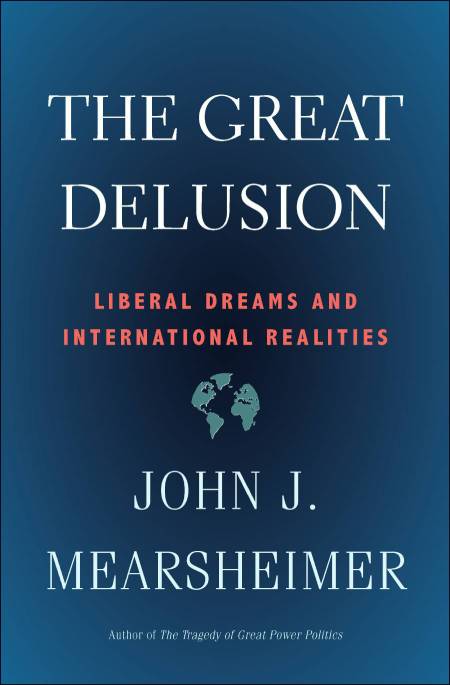By David Gordon, Ludwig von Mises Institute
John Mearsheimer has written a book of great importance for those of us who believe in a free society, along the lines best laid out by Ludwig von Mises and Murray Rothbard. Mearsheimer, who is the leading contemporary theorist of “realism” in international relations, points out a vital truth that supporters of the free market neglect to our peril. Nationalism is for most people a far more potent force than liberalism, whether classical or modern. Attempts to impose liberal values on the world, to force people to be free, are doomed to failure and will enhance the chances of war.
Although Mearsheimer specializes in foreign policy, he tells us that since his days in graduate school, he has retained a strong interest in political theory as well. “In the fall of 1976, I took the Field seminar in Political Theory taught by Professor Isaac Kramnick. The class, which introduced students to the writings of seminal thinkers like Plato, Machiavelli, Hobbes, Locke, Rousseau, and Marx, had a greater impact on me than any other course I have ever taken.”(p.viii) (Kramnick, by the way, in his The Rage of Edmund Burke (1977) supported Murray Rothbard’s view that Burke’s defense of anarchism in A Vindication of Natural Society was seriously intended rather than satirical.)
Though many of Mearsheimer points in his discussion of political theory are insightful, he is sometimes mistaken. But for our purposes his mistakes do not much matter, as his main contention remains unscathed. The main area Mearsheimer is open to challenge is that to him, the notion of objective ethics does not so much as make sense. People disagree about the good life, and there is no more to be said: “The power of this belief in objective truth often surfaces when a person is accused of being a moral relativist—someone who believes there are no right or wrong answers to life’s big questions. . .Yet different people will answer the same questions in different ways and there is no mechanism for choosing among their responses. Often the more specific the question, the more intractable the disagreements. It is impossible to determine which person has the correct answer; it is all a matter of personal preference or opinion. The smart fallback position for dodging the relativism charge is to maintain that there is an objective set of first principles and I know what they are, but I cannot persuade everyone else to recognize them. . .What does this viewpoint say about our collective ability to use reason to arrive at a universal, or even widely shared, understanding of the good life? It tells us people who believe that their critical faculties can help them find moral truth are deluding themselves.” (pp.23-24)

It is odd that Mearsheimer cannot see the difference between being correct and commanding universal agreement, but, as mentioned before, this does not matter for the main purpose of the book. Even if there is an objectively true morality, people act on their beliefs about morality, not the objective truth. We shall now see how this undermines the program of liberal hegemony that Mearsheimer opposes. (Though it is off our main topic, Mearsheimer’s remarks about that enigmatic figure Leo Strauss should not be missed. He maintains that Strauss “believes reason’s strong suit is not discovering truth but calling into question existing moral codes and other widely held beliefs.”[p.28])
To return to the author’s central thesis, he distinguishes two variants of political liberalism: “modus vivendi liberalism and progressive liberalism. . .they think differently about the content of individual rights and about the role of the state. For modus vivendi liberals, rights are all about individual freedom to act without government interference. . .Progressive liberals also prize individual freedoms, but they also believe in rights that call for the government to help its citizens.” (p.45)
It is mostly progressive liberals who favor the project of liberal hegemony, Mearsheimer’s principal target. “What happens when a powerful state adopts a liberal foreign policy? In other words, what happens when a country that is deeply committed to individual rights and doing social engineering to promote those rights employs that template in the wider world? That formidable state will end up embracing liberal hegemony, a highly interventionist foreign policy that involves fighting wars and doing significant social engineering in countries throughout the world. Its main aim will be to spread liberal democracy, toppling authoritarian regimes in the process, with the ultimate goal of creating a world populated solely by democracies.” (p.120) A nation rarely is in a position to pursue such an agenda, because of conflicts with rival powers; but in the “unipolar moment” following the end of the Soviet Union, the United States found itself in a position to attempt liberal hegemony, if so minded.

It is here that Mearsheimer’s emphasis on moral disagreement comes to the fore. Because many societies around the world reject the values held by progressive liberals, the attempt to impose these values on them will lead to massive resistance. “The problem is particularly acute when the United States invades another country, because the American military forces occupying that country inevitably end up tasked with the nation-and state-building necessary to produce a functioning liberal democracy . . . It is clear from the historical record that the effort to impose democracy on another country usually fails. . .” (p.169)
Liberal hegemony faces an even more severe obstacle to success, and grasping the nature of this obstacle is the main lesson Mearsheimer’s book has to teach us. However much we may favor the free market, we must recognize that nationalism is for most people a much more potent emotion than their commitment to classical liberalism. Though it is progressive liberal proponents of liberal hegemony who most need to absorb this vital point, we also need to bear it in mind.
Concerning nationalism, Mearsheimer remarks: “Nationalism is an enormously powerful political ideology. It revolves around the division of the world into a wide variety of nations, which are formidable social units, each with a distinct culture. Virtually every nation would prefer to have its own state, although not all can. Still, we live in a world populated almost exclusively by nation-states, which means that liberalism must coexist with nationalism. Liberal states are also nation-states. There is no question that liberalism and nationalism can coexist, but when they clash, nationalism almost always wins.” (p.5)

Defenders of global hegemony must confront yet another obstacle, one to which Mearsheimer has devoted a large part of his professional career to explain. In the modern world, sovereign states confront one another and endeavor to defend their security interests. They will not look kindly on attempts to infringe on those interests in the name of promoting liberal democracy.
The United States made a fundamental error when it ignored this point in an effort to bring liberal democracy to Ukraine. “The final tool for peeling Ukraine away from Russia was the effort to promote the Orange Revolution. The United States and its European allies are deeply committed to fostering social and political change in countries formerly under Soviet control. . .Of course, Russian leaders worry about social engineering in Ukraine, not just because of what it means for Ukraine but also because they think Russia might be the next target.” (p.191). By failing adequately to take account of Russia’s security interests, American progressive liberals have badly worsened the diplomatic situation.
Mearsheimer, it is clear, wants to replace liberal hegemony with his own brand of realism, though the details of his preferred line of action are largely to be found in other books. Here we cannot agree to follow him. He favors “offshore balancing”, which is substantially less interventionist than current U.S. policy, but still interventionist; and if he seeks rapprochement with Russia, he is prepared for confrontation with China.
Fortunately, there is a way to bring realism closer a genuine policy of non-intervention, and it is one than Mearsheimer himself recognizes. There are two sorts of realism, offensive and defensive. Mearsheimer supports the former, but he acknowledges that the other school is much less interventionist. “Many realists actually believe that if states acted according to balance-of-power logic there would be hardly any wars between the great powers. . .The historian Marc Trachtenberg, who looks at the world from the perspective of a defensive realist, explicitly argues that following the dictates of realism leads to a relatively peaceful world, while acting according to what he calls ‘impractical idealism’ leads to endless trouble.” (p.221)
Although no doubt a gap remains between defensive realism and genuine non-intervention in the style so ably advocated by Ron Paul, both positions recognize the dangers of ideological crusades. They do not “go abroad in search of monsters to destroy.”
The Great Delusion: Liberal Dreams and International Realities. By John J. Mearsheimer. Yale University Press, 2018. Xi + 313 pages.
David Gordon is a Senior Fellow at the Ludwig von Mises Institute. He was educated at UCLA, where he earned his PhD in Intellectual History. He is the author of numerous books.
Note: The views expressed in this article are the author/s, and not the position of Intellectual Dose, or iDose (its online publication). This article is republished from the Mises Wire under a Creative Commons license.



